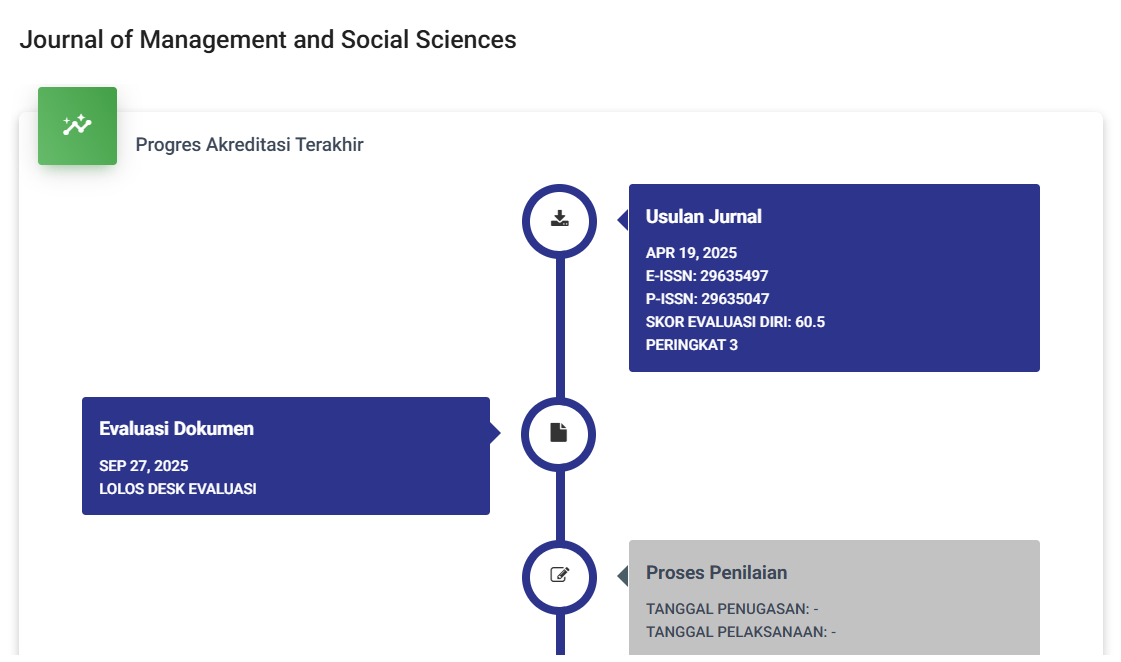Peran Pengikut dalam Kepemimpinan Spiritual pada Pegawai di Universitas Ibrahimy Situbondo
DOI:
https://doi.org/10.55606/jimas.v3i4.1592Keywords:
spiritual leadership, followers, spiritualityAbstract
This study explores the role of followers in spiritual leadership at Ibrahimy University Situbondo, focusing on how followers’ spirituality, values, and expectations influence their interactions with leaders and their impact on the effectiveness of spiritual leadership. Using a qualitative phenomenological approach, this study involved in-depth interviews and observations of university employees. The results showed that spiritual leadership, based on values such as compassion, justice, and integrity, can increase employee job satisfaction, engagement, and commitment. Followers with higher levels of spirituality are more easily connected to the spiritual values promoted by the leader, creating synergy between personal and organizational goals. In contrast, followers with lower spirituality require a more flexible and personal leadership approach. This study emphasizes the importance of adapting leadership according to followers’ spirituality and the need for organizations to facilitate spiritual development in order to create a harmonious and productive work environment.
References
Avolio, B., Walumbwa, F., & Weber, T. (2009). Leadership: current theories, research, and future directions.. Annual review of psychology, 60, 421-49 . https://doi.org/10.1146/annurev.psych.60.110707.163621.
Baron, L., Rouleau, V., Grégoire, S., & Baron, C. (2018). Mindfulness and leadership flexibility. Journal of Management Development, 37, 165-177. https://doi.org/10.1108/JMD-06-2017-0213.
Bella, R., Quelhas, O., Ferraz, F., & Bezerra, M. (2018). Workplace Spirituality: Sustainable Work Experience from a Human Factors Perspective. Sustainability. https://doi.org/10.3390/SU10061887.
Benefiel, M. (2005). The second half of the journey: Spiritual leadership for organizational transformation. The Leadership Quarterly, 16(5), 723-747.
Berg, J. (2015). The role of personal purpose and personal goals in symbiotic visions. Frontiers in Psychology, 6. https://doi.org/10.3389/fpsyg.2015.00443.
Braun, V., & Clarke, V. (2006). Using thematic analysis in psychology. Qualitative Research in Psychology, 3(2), 77-101.
Charmaz, K. (2006). Constructing Grounded Theory: A Practical Guide through Qualitative Analysis. SAGE Publications.
Chen, C., Yang, C., & Li, C. (2012). Spiritual Leadership, Follower Mediators, and Organizational Outcomes: Evidence From Three Industries Across Two Major Chinese Societies1. Journal of Applied Social Psychology, 42, 890-938. https://doi.org/10.1111/J.1559-1816.2011.00834.X.
Creswell, J. W. (2013). Qualitative Inquiry and Research Design: Choosing Among Five Approaches (3rd ed.). SAGE Publications.
Creswell, J. W., & Miller, D. L. (2000). Determining validity in qualitative inquiry. Theory into Practice, 39(3), 124-130.
Duchon, D., & Plowman, D. A. (2005). Nurturing the spirit at work: Impact on work unit performance. The Leadership Quarterly, 16(5), 807-833.
Fry, L. W. (2003). Toward a theory of spiritual leadership. The Leadership Quarterly, 14(6), 693-727.
Fry, L. W., & Cohen, M. P. (2009). Spiritual leadership as a paradigm for organizational transformation and recovery. Research in Human Resource Management, 11(2), 175-204.
Fry, L. W., & Slocum, J. W. (2008). Maximizing the triple bottom line through spiritual leadership. Organizational Dynamics, 37(1), 86-96.
Fry, L. W., Vitucci, S., & Cedillo, M. (2005). Spiritual leadership and army transformation: Theory, measurement, and establishing a baseline. The Leadership Quarterly, 16(5), 835-862.
Giorgi, A. (2009). The Descriptive Phenomenological Method in Psychology: A Modified Husserlian Approach. Duquesne University Press.
Guest, G., Bunce, A., & Johnson, L. (2006). How many interviews are enough? An experiment with data saturation and variability. Field Methods, 18(1), 59-82.
Jiang, J., Ye, Z., Liu, J., Shah, W., & Shafait, Z. (2023). From “doing alone” to “working together”—Research on the influence of spiritual leadership on employee morale. Frontiers in Psychology, 14. https://doi.org/10.3389/fpsyg.2023.992910.
Makkar, S., & Singh, A. (2020). A conceptual development of spiritual leadership model. International Journal of Business and Globalisation. https://doi.org/10.1504/ijbg.2020.10032723.
Patton, M. Q. (2002). Qualitative Research and Evaluation Methods (3rd ed.). SAGE Publications.
Phipps, K. A. (2012). Spirituality and strategic leadership: The influence of spiritual beliefs on strategic decision-making. Journal of Business Ethics, 106(2), 177-189.
Puspitasari, S. (2019). Pengaruh kepemimpinan spiritual terhadap kepuasan kerja karyawan melalui motivasi intrinsik dan komitmen organisasi (Studi kasus Rumah Sakit Islam Sultan Agung, Semarang). Jurnal Ekonomi Dan Bisnis, 20(1), 73-84.
Reave, L. (2005). Spiritual values and practices related to leadership effectiveness. The Leadership Quarterly, 16(5), 655-687.
Salas-Vallina, A., Simone, C., & Fernández-Guerrero, R. (2020). The human side of leadership: Inspirational leadership effects on follower characteristics and happiness at work (HAW). Journal of Business Research. https://doi.org/10.1016/j.jbusres.2018.10.044
Sanders, J. E., Hopkins, W. E., & Geroy, G. D. (2004). A causal assessment of spiritual leadership theory: Organizational commitment and workplace spiritual intelligence. Journal of Management Inquiry, 13(3), 273-287. DOI: 10.1080/14766080509518566
Udahemuka, Fidelis & Walumbwa, Fred & Ngoye, Ben. (2024). Enhancing Meaningful Work The Roles Of Spiritual Leadership, Intrinsic Motivation, And Employees' Gender. International Journal of Business and Society. 25. 713-735. 10.33736/ijbs.7624.2024.
Wang, M., Guo, T., Ni, Y., Shang, S., & Tang, Z. (2019). The effect of spiritual leadership on employee effectiveness: An intrinsic motivation perspective. Frontiers in Psychology, 9, 2627. https://doi.org/10.3389/fpsyg.2018.02627
Yang, Mari & Fry, Louis. (2018). The role of spiritual leadership in reducing healthcare worker burnout. Journal of Management, Spirituality & Religion. 15. 1-20. 10.1080/14766086.2018.1482562.
Yukl, G. (2010). Leadership in Organizations (7th ed.). Prentice Hall.
Downloads
Published
Issue
Section
License
Copyright (c) 2024 Rizki Hidayaturrochman, Aisyatin Kamila

This work is licensed under a Creative Commons Attribution-ShareAlike 4.0 International License.








